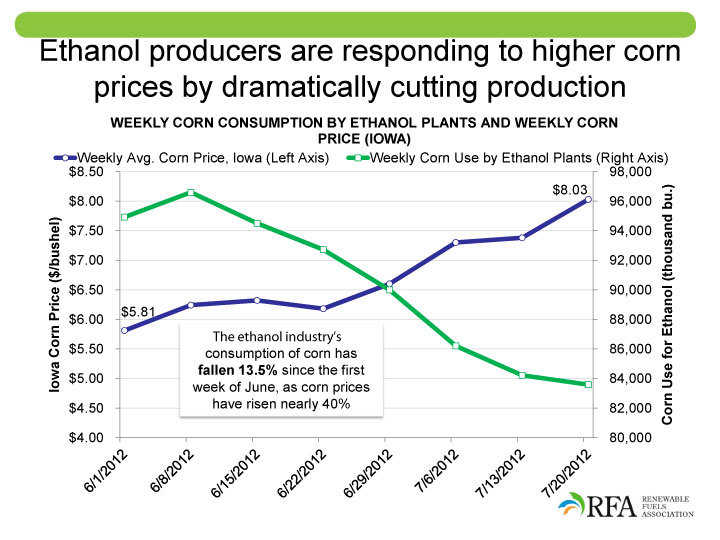Ethanol industry pushes back against RFS attacks



August 3, 2012
BY Holly Jessen
A day after more than 100 members of the U.S. House of Representatives sent a letter to Lisa Jackson, administrator of the U.S. EPA, urging relief from the renewable fuel standard, two trade associations of the ethanol industry laid out many reasons why a RFS waiver is not needed.
“This year’s weather has been more than challenging for farmers and ranchers across the country,” said Renewable Fuels Association President and CEO Bob Dinneen. “However, waiving the RFS will not make it rain in Indiana, bring pastures to life in the Plains, or meaningfully lower corn prices.”
During a joint news conference held Aug. 2, the RFA and Growth Energy pointed out that the marketplace is already rebalancing and that there are flexibilities built into the RFS to help refiners meet blending obligations. “The RFS is clearly under attack, it really is a shame the critics are trying to take this drought and turn it around and blame ethanol,” said Tom Buis, CEO of Growth Energy.
Advertisement
It’s important to keep in mind that the ultimate outcome of this year’s corn crop won’t be known until harvest, Buis added. In addition, with grain farmers already suffering due to drought, it just doesn’t make sense to remove a portion of demand for corn. “That seems to be a shortsighted approach in a very serious time,” he said.
He also mentioned some of the false claims that come up, over and over. One is that ethanol consumes 40 percent of the corn crop, which doesn’t take into account the distillers grains coproduct, which goes back into the marketplace as an animal feed. According to an analysis from Monsanto, accounting for the corn and soybean for feed that is offset by distillers grains, ethanol utilizes 14.5 million acres of the total 88.2 million acres of corn planted. “What you end up with is 16 percent of net corn acres is used by ethanol,” he said.
RFA and Growth Energy’s goal, Dinneen said, was to provide some perspective on an issue that “has become a lightning rod on Capitol Hill.” When the RFS was developed, a lot of flexibility was built into the program in response to oil refiners’ concerns about marketplace anomalies, such as the current drought. The first is Renewable Identification Number (RIN), a credit trading mechanism, which allows refiners to build up credits for the gallons of ethanol that has not been used for compliance with the RFS. “There are 2.5 billion RINs in the marketplace today, that builds a lot of flexibility into this program and can allow refiners to meet their obligations without having to blend wet gallons,” he said, adding that obligated parties can also carry over their obligations for a year and meet it in the next year.
Advertisement
The waiver provision, which many are calling for now, was also built-in flexibility in the RFS. However, putting the waiver in place is based on the supply of ethanol and the ability of refiners to meet their obligations. In fact, the ethanol industry has been overproducing ethanol and there are currently 800 million gallons of ethanol in the marketplace today, which can be used to meet future obligations. “Clearly there is more than enough ethanol supply, additional RINs in the marketplace and flexibility for refiners to meet obligations this year,” he said. “It is not going to be an issue.”
As for concerns about future tight supplies of corn, the ethanol industry has already responded to market signals and has reduced its production rates. Since June 8, when drought stress first became apparent, the industry has cut back on its consumption of corn by 13.5 percent, as corn prices have risen nearly 40 percent and some plants have cut run rates or even temporarily idled, he said.
Waiving the RFS is unnecessary, Dinneen said. It would be a bad policy decision, especially if the U.S. is serious about commercializing advanced technologies, such as cellulosic ethanol from alternate feedstocks. Buis agreed, adding that lately it isn’t just ethanol that is being attacked, all alternative fuels are under attack. “We just can’t go around tinkering with a program that is working,” he said.
The American Coalition for Ethanol also chimed in, releasing a statement that pointed out that ethanol currently costs less than gasoline. Reducing the RFS blending mandates would force consumers to pay more at the pump, said Brian Jennings, ACE executive vice president. In addition, a recent analysis conducted by Bruce Babcock, an economist at Iowa State University, shows that waiving the RFS wouldn’t result in additional or cheaper feed for livestock. “Efforts to block the RFS, whether by the meat industry who wants cheap corn or members of Congress who never supported the RFS in the first place, are misdirected,” Jennings said. “If ethanol producers didn’t create a market for low value corn starch, there would be less corn available for all sectors and livestock producers wouldn’t have access to large quantities of distillers grains, the high value, high protein feed resulting from ethanol production.”
Upcoming Events





